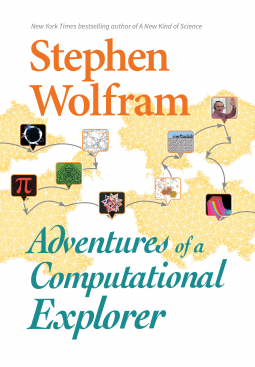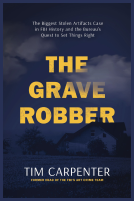
Adventures of a Computational Explorer
by Stephen Wolfram
This title was previously available on NetGalley and is now archived.
Send NetGalley books directly to your Kindle or Kindle app
1
To read on a Kindle or Kindle app, please add kindle@netgalley.com as an approved email address to receive files in your Amazon account. Click here for step-by-step instructions.
2
Also find your Kindle email address within your Amazon account, and enter it here.
Pub Date Oct 21 2019 | Archive Date Nov 30 2019
Talking about this book? Use #ComputationalAdventures #NetGalley. More hashtag tips!
Description
Through his pioneering work in science, technology and language design, Stephen Wolfram has developed his own signature way of thinking about an impressive range of subjects. In this lively book of essays, Wolfram takes the reader along on some of his most surprising and engaging intellectual adventures. From science consulting for a Hollywood movie, solving problems of AI ethics, hunting for the source of an unusual polyhedron, communicating with extraterrestrials, to finding the fundamental theory of physics and exploring the digits of pi, Adventures of a Computational Explorer captures the infectious energy and curiosity of one of the great pioneers of the computational world. Stephen Wolfram is a distinguished scientist and best-selling author, and the creator of some of the world's most respected software systems, including Mathematica, Wolfram|Alpha and the Wolfram Language. For more than 30 years he has been the CEO of the global technology company Wolfram Research.
Advance Praise
"Stephen Wolfram is a genius. But that’s not the most uncommon of his attributes. He is fiercely and fully independent, in every possible sense of the word. Wolfram does everything, literally everything, on his own terms."
--Nassim Nicholas Taleb, New York Times bestselling author of The Black Swan and Fooled by Randomness
"Stephen Wolfram has the most brilliant computational mind I have ever encountered. His endless curiosity, breadth of knowledge, and attention to detail, are truly astonishing. ‘Adventures’ is a wild ride down the Rabbit Hole."
--Nova Spivack, Chairman, Arch Mission Foundation
"This tour of Stephen Wolfram's mind is a jungle journey where ferocious new ideas jump out at you, then charm you. Read it in batches, because the idea density is high and pleasure long."
--Gregory Benford, author of Nebula award winning Timescape
"Stephen Wolfram is one of the remarkable scientists and technologists of our time, a physicist who went deep into computing, first as a means to an end creating computing tools, and then as a fundamental way to understand our universe. In Adventures of a Computational Explorer, he shares episodes of his journey, written in his characteristically direct and engaging style."
--Nathan Myhrvold, Founder and CEO of Intellectual Ventures
Available Editions
| EDITION | Hardcover |
| ISBN | 9781579550264 |
| PRICE | |
Links
Average rating from 25 members
Featured Reviews
 Librarian 431790
Librarian 431790
This is an interesting collection of essay and thoughts about life and work written by a computer genius like Stephen Wolfram.
I liked the style of writing and it gave me food for thought.
Highly recommended!
Many thanks to the publisher and Netgalley for this ARC, all opinions are mine.
 David W, Media/Journalist
David W, Media/Journalist
The basic message of both Stephen Wolfram’s new book and his life is that somehow, everything can be reduced to computation. This levels the playing field, gives researchers a clear path to follow, and in very many ways, is proving not only true, but advantageous. Adventures of a Computational Explorer is the Stephen Wolfram story, as seen through his work and discoveries. Fortunately, he loves to share.
For example, his knowledge engine, Wolfram Alpha’s “goal is to take as much knowledge about the world as possible, and make it computable, then to be able to answer questions as expertly as possible about it.” It is a free online service tapping the knowledge of the world. A favorite example of its power is “What is flying overhead right now?”
He has learned to find ways to make theories applicable in far broader ways. “What I’ve come to realize … is that the same intellectual thoughts processes can be applied not just to what one thinks of as science, but to pretty much anything.” The result is creative thinking in science fiction, music, graphic design, search, analytics and productivity. For starters.
Wolfram lives in a meta universe somewhere above ours. He goes big. He is all about the universe of possible theories on any topic: the universe of possible languages for example, and even the universe of possible universes. His two main theories, from which everything he does derives are the Theory of Computational Equivalence and the Theory of Computational Irreducibility. The only thing missing is the single, simple, underlying theory of all physics, he says. He’s hoping we come up with that soon.
This is a man who has collected every spec of data on himself since 1980. It includes GPS location and steps, phone calls inbound and out, emails inbound (2.3 million) and out, every keystroke he’s ever made (7% are backspaces), every meeting he’s been involved in, onset time and length of phone calls… In total, he proudly claims to have 1.7 million files on himself. Of the 230,000 pieces of paper, most have been scanned and OCR’d, with the OCR text overlaying the image. When he goes to events, he wears a small camera above his ID badge. It takes a photo every 30 seconds, so he can remember everyone he met, everything he saw, and if they didn’t exchange cards, the name on the other person’s badge. “It won’t be long before it’s clear how incredibly useful it all is – and everyone will be doing it, and wondering how they could have ever gotten by before,” he says.
There are light moments too. On the launch date of Wolfram Alpha, the knowledge engine, someone asked about the world’s fastest bird, and the system replied: “A frozen chicken will reach 200 mph if you drop it from a plane.”
There is a 40-page chapter explaining Spikey, the Wolfram logo. It is a rhombic hexecontahedron, if that helps. It has 60 sides, all of which are rhomboids in the golden ratio 1.618:1, making them golden rhombuses. Wolfram and his employees went through endless pages of examples they generated, looking for something unique, appealing and dramatic. For years, engineers worked on variations and refinements, and together they determined the ideal version, making it their unique logo. Then, they discovered it is called the giramundo and has been sewn together by women in Brazil for hundreds of years.
The amount of effort that went into it is staggering, but it is no different than anything else at Wolfram. The name for the Wolfram computer language took three decades to determine. They examined how human languages get names, how computer languages get names, how words sound and feel, what images and associations they raise, how long they are, and on and on. Finding nothing that fit the bill, they settled on The Wolfram Language. After 32 years of research and meetings.
Wolfram the CEO is just as different a breed. His meetings are all livestreamed – publicly. Anyone can chime in, and dedicated employees will feed appropriate public comments to the participants for consideration. This is of course a brilliant tactic. It co-opts minds worldwide at no charge. And since Wolfram is one of the very few large corporations that really has nothing to hide, the light of day is not an issue. Much of the company’s great works become free websites, from Wolfram Alpha to Wolfram Tones, which lets composers generate new music themes through computational rules.
The company employs 800 very bright people around the world, and he is in constant touch through conference calls and e-mail. He doesn’t like video conferences because everyone should be able to multitask without seeming to not be paying full attention to the boss. Wolfram is the place you want to work.
It all amounts to a strange sort of autobiography. Wolfram describes how he thinks, how he works, and how he plays. His work is his play. It’s all he does, and he does it from home, visiting his office a few times a year. In the book, he devotes nearly 50 pages in one chapter to describe the infrastructure he has built for his own (prodigious) productivity. This goes as far as calculating the optimum speed on a treadmill so that no one will know he’s on a treadmill, as well as for optimum control of his laptop and mouse while on it. He keeps a small collection of ready-packed plastic bags filled for different functions, such as Trade Show or Office. Ready to grab and go. His desk computer has two screens, one private and one public that everyone can see on the livestreamed calls. In 400+ pages, his children are only mentioned insofar as they have occasionally contributed to his work. His wife is never named. It’s all about optimizing his personal productivity every waking minute.
It’s a remarkable book on a remarkable style, but it’s not a slam dunk. Wolfram simply repurposed articles and posts without editing. This means you get sentences that begin with “Just last week I …” which only make sense if you look up the date of the post under the title. He also assumes a fairly high level of knowledge, particularly about acronyms. You’re supposed to know what IUPAC and KVM stand for, because he won’t explain them.
The book is delightfully filled with images. Many are screenshots that show what he describes in the text above them. But they are so small you must have a magnifying glass handy or you won’t see what he’s writing about, making the whole effort pointless. All the intricate graphics they generated and the words on the webpages are wasted. I hope the final version has the images in color, because my review copy was pure monochrome, useless when he indicates the gold bar means this and the brown bar means that. Interestingly, there are no links to online services or references for what he writes. And nothing in the book credits meetings or collaborations or even inspirations from other scientists (though a couple times he mentions employees who have dug deep). It’ all Wolfram all the time.
These quibbles aside, Adventures of a Computational Explorer is unlike any other autobiography, and a noteworthy addition to the canon.
David Wineberg
 Manuel A, Reviewer
Manuel A, Reviewer
“’You work hard...but what do you do for fun?’ people will ask me. Well, the fact is that I’ve tried to set up my life so that the things I work on are things I find fun. [... ] Sometimes I work on things that just come up, and that for one reason or another I find interesting and fun. [...] It [ the paradigm for thinking] all centers around the idea of computation, and the generality of abstraction to which it leads. Whether I’m thinking about science, or technology, or philosophy, or art, the computational paradigm provides both an overall framework and specific facts that inform my thinking. [...] I often urge people to ‘keep their thinking apparatus engaged’ even when they’re faced with issues that don’t specifically seem to be in their domains of expertise.”
In “Adventures of a Computational Explorer” by Stephen Wolfram
“The real payoff comes not from doing well in the class, but from internalizing that way of thinking or that knowledge so it becomes part of you.”
In “Adventures of a Computational Explorer” by Stephen Wolfram
What do “Arrival”, “Gödel’s Incompleteness Theorems”, TCE (Theory of Computational Equivalence), Theory of Computational Irreducibility (TCI), AI, Coding, ..., Physics (e.g., Quantum Mechanics], and Computer Science have in common? Stephen Wolfram.
If you're into stuff like this, you can read the full review elsewhere (vide link on the GR's review).
 Brad H, Reviewer
Brad H, Reviewer
Adventures of a Computational Explorer by Stephen Wolfram
My rating: 5 of 5 stars
I have a TON to say about Stephen Wolfram, but for the sake of reviewing, I'll highlight. :)
I'm a fanboy. I mean, back in the day when I first saw Wolfram Alpha get released, I practically pooped myself. An all-round science tool that aimed to combine every known function in the world in one easy search bar that you can use real language with? I downloaded the hell out of it and squeed with joy that there were people like this in the world that would make things like this.
Everything that can be computed, in ONE PLACE. As much knowledge as possible, as broadly applicable as possible, available to everyone.
I mean, sure, it's bound to be buggy and a constant work in progress, but this is a pure repository of knowledge, man, and IT'S FREE. :) And it's not just about data, but about how to calculate reality. :) Yay!
Okay, peeps, I know this seems really geeky and all, and I agree. But Stephen Wolfram is a real-life hero. He's putting his prodigious mind into the problem of Everything. Language, Rosetta Stones for aliens, repositories of all knowledge, and working out the problems inherent in his Theory of Computational Equivalence and the Theory of Computational Irreducibility. (Put simply, nature does the same thing as well and Gödel's Incompleteness Theorem, writ large.)
It also means he's doing all the heavy lifting for an AI that will rule the physical world.
But fortunately, he's also been a real-life SF example of someone who has recorded and programmed, in the Wolfram programming language, every instant of his life, correspondence and thought process, including every keystroke he's ever made, every meeting he's ever been in, and he's now in a very unique position to be uploaded directly into the web, maintaining everything he is and every decision he's made, ready to combat said AI. :)
I joke, sure, but the reality of such a monumental undertaking is REAL. This book is an autobiography of sorts and he loves to share. I kinda wondered where he was going with a lot of it, but then I came up with my theory and so narrative consistency is resolved. :)
Fun fact! All those equations in the movie Arrival? Thank Stephen Wolfram's son. :) Both were consultants to make the math real. :) No BS. :) That's REAL STUFF, man! :)


















